Early voting for the August 3rd Shelby County election ballot has been brisk, and the news has been good for some candidates — for example, state senator Steve Cohen, whose 9th District congressional candidacy is surely profiting from a disproportionate turnout of white Democrats at Poplar Corridor and East Memphis sites (See also Politics, p. 15). The same figures may not be so comforting to other candidates — like Division 5 General Sessions judge Betty Thomas, a vigorous campaigner who, as a first-time judicial candidate, won her seat on the bench eight years ago in a multi-candidate field. She now finds herself matched one-on-one against newcomer Evan Nahmias, who could well draw heavily from the same precincts.
Many a presumed sure-thing outcome could be imperiled if the demographics of that early-voting trend continue to and through Election Day, which will still be the occasion for most of the voting. Rarely has so much advance fear and trembling attended an election as is the case with the mammoth August 3rd ballot, with its well-over-100 races to decide no matter where one lives in Shelby County. Everybody, it seems, has heard the horror stories about misadventures, delays, and errors connected with the new Diebold machines that are being employed for the first time (see “Vote Early and Often,” p. 25). Such problems, along with long lines at the polls, could well be a disincentive for working-class voters who don’t have the available time to vote at odd hours or endure lengthy delays.
Other factors that could affect the voting include two big races of transcendent interest. One is the 9th District congressional race where presumed leader Cohen faces a field of 14 other Democrats, four or five considered capable of catching up or coming close with a final spurt. The other is the Republican U.S. Senate primary, in which both local longtime favorite Ed Bryant, a former 7th District congressman, and newly ascendant Bob Corker, the deep-pocketed former mayor of Chattanooga, will be working at revving up their strength in Shelby County. (A third candidate, former 4th District congressman Van Hilleary, was largely confining his efforts to Middle and East Tennessee.)
Local Republicans had been at least as grateful as was Democrat Harold Ford Jr. in April for the last-minute withdrawal of Democratic U.S. Senate candidate Rosalind Kurita, a state senator from Clarksville. The departing 9th District congressman thereby became this party’s de facto nominee and could husband his resources for the fall instead of working overtime to boost primary turnout.
That fact meant that Republicans, who have predominated among local countywide officeholders since the advent of partisan elections in the mid-’90s, had a fighting chance to hold on to their gains against what has been proclaimed for two full decades as an inevitable demographic tide favoring Democrats. To be sure, a steady out-migration of the white (and black) middle class had, at least in theory, diluted the Republican share of the total Shelby County vote. But the GOP has so far managed to prevail, at least in countywide elections, by superior turnout on Election Day.
It won’t be so this year, insists veteran Democratic activist David Upton, who points to a contrary trend that has seen black inner-city turnout rise somewhat disproportionately in city-wide and presidential elections.
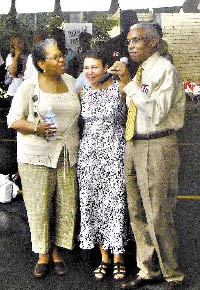 Jackson Baker
Jackson Baker
Happily locked in a Wharton sandwich recently was judicial candidate Janet Lansky Shipman, endorsed by the county mayor and his wife, lawyer Ruby Wharton
“[D]isgraceful and shameful disgraces … ”
Turnout is only one factor to reckon with. A number of races seem unusually responsive to the nature of the coattails that this or that candidate happens to be attached to. This is especially the case with the ostensibly nonpartisan judicial races.
As an example, former prosecutor and current county personnel director Janet Lansky Shipman, one of four unusually qualified candidates in the race for the open Division 7 Criminal Court seat, was boosted by an unusual twofer. Hers was the only radio ad of the political season that could legitimately summon up the spirit of the King, Elvis Presley himself, who had famously purchased his threads at the Lansky family’s Beale St. clothing store. And she also claimed support from the mayor — Shelby County chief executive A C Wharton, who pointedly endorsed her late in the campaign.
Not bad, although rival Lee Coffee, an assistant district attorney, also has a number of high-profile endorsements, and the two other candidates, attorney Larry H. Nance and federal public defender Doris Holt, also are well regarded.
This year’s judicial races were unusually dependent on other people’s say-so, with two bar associations, two political parties, innumerable ad hoc groups, and several private individuals offering up a confusing mélange of slates and endorsement tickets.
In previous years, judicial contests, conducted according to official canons that would have put the Marquis of Queensberry to sleep, had been staid, formal, and not terribly revealing. But this year’s have been characterized by an unprecedented degree of invective, involving not only quarreling blocs of backers but intramural animosities within political organizations and occasional name-calling between the competing candidates. The most glaring instance of the latter came early on when Deep Throat-era prosecutor Larry Parrish decided that his political comeback effort required a full-scale verbal assault on his opponent, Division 8 Circuit Court judge D’Army Bailey, a former Berkeley radical turned establishmentarian.
Parrish contrived to append to a routine legal pleading a direct attack on Bailey, an occasional actor in movies (including The People v. Larry Flynt, a biopic about the publisher of Hustler magazine). “As part of my campaign,” Parrish suggested in a confusing (and perhaps confused) passage of his affidavit, a link was made from Bailey to the pimp/hustler problem manifested in another Memphis-made movie (apparently last year’s Hustle & Flow, which the thespian/judge had in fact not appeared in). Said Parrish: “I will reiterate how disappointed I was in being told that in May 2006 Judge Bailey appeared in public (at a Memphis In May event) wearing a T-shirt on which the word ‘Mafia’ was printed and garbed in flashy jewelry typical of Memphis pimps, giving dignity and legitimacy to two of the more disgraceful and shameful disgraces this city must bear.”
Yes, this really happened. Bailey’s only recorded response at the time was to say, “This guy is going to make the lawyers love me.” And, sure enough, the incumbent, who had always taken his lumps in annual Bar Association ratings, easily outdid Parrish in this year’s published evaluation of candidates by members of the Memphis bar.
But nonfederal judges in Shelby County are elected, and it clearly would take more than approbation by lawyers, official or otherwise, to put a candidate over in this year’s highly politicized atmosphere (For a commentary on judges and politics in the context of the election process, see retired Judge Robert Lanier‘s Viewpoint column, “Judging the Justices,” p. 17). Politics being politics, personal characteristics count for something. One of the most closely watched races is that for Chancellor, Part 2, which matches incumbent Arnold Goldin, well-regarded across partisan lines, against newcomer Carlee McCullough, currently a contract-compliance officer for the city of Memphis. Both contenders possess more than their share of charm, but Goldin is more heavily credentialed.
Gale Jones Carson, head of this year’s Democratic countywide coordinated campaign, discounts the importance of credentials, noting that many of the judges now officiating in Shelby County lacked a lengthy resume but have performed well once on the bench. It’s the ultimate learn-by-doing job, she maintains.
Credentials were certainly not the only issue back in June, when a lawyer-dominated screening committee proposed a slate of judicial endorsees to the Shelby County Democratic Party’s executive committee. That meeting descended into chaos as epithets were exchanged and several of the screening committee’s recommendations were undone.
In many cases, race was suspected as a motive. Committee members and onlookers at the rowdy Democratic endorsement meeting resorted frequently to accusations of that sort — and that debate continued in the public prints, or at least in the blog portion of it, where the debate continues to rage.
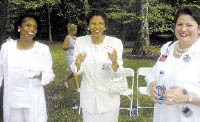 Jackson Baker
Jackson Baker
Judicial-race rivals Deborah Henderson (left) and Regina Morrison Newman (right) flank Charter Commission candidate Sharon Webb.
Blog Warfare, Internal Threats, and a Showdown or Two
An intriguing footnote to that Democratic meeting: One of the interested bystanders was lawyer Richard Fields, who was overheard observing to longstanding party man (and fellow lawyer) David Cocke: “Y’all ought to get rid of Del Gill.” Gill is the professionally obstreperous party gadfly whose sting usually ends up being turned on himself. At that moment, he was interrupting proceedings every 30 seconds with this or that motion or complaint. When Cocke merely shrugged and said, “He keeps getting elected!” Fields persisted. “Y’all ought to kick him off the committee.” What made that exchange both interesting and ironic was that Fields, a maverick in his own right, had been the only committee member kicked off in recent memory — for having been one of Republican Terry Roland‘s litigators in legal actions opposing Democrat Ophelia Ford‘s election last year in a special state Senate race.
In any case, Fields was not through with the matter. He promptly circulated copies of a letter to members of the Memphis bar containing his own judicial endorsements — as well as embarrassing information about the professional and personal affairs of candidates he disapproved of. (This exhibit, too, may be perused atMemphisFlyer.com.) Fields’ letter galvanized blogger Thaddeus Matthews into turning the tables on several of Fields’ picks, outing some of their own previously closeted skeletons. Nor did Fields himself escape retribution, as Matthews’ blog went on to charge the lawyer himself with grievous private misdeeds. (In this Google-happy age, readers interested in the further details of this and related controversies will have no trouble locating them on the Internet.)
Republicans, meanwhile, experienced their own internal frets. One of them concerned the activities of one Angelo Cobrasci (see “Right of Right,” p. 21), who has displaced longtime party maverick Jerry Cobb as the chief irritant to the local GOP establishment. But whereas Cobb has long been considered a nitpicker, Cobrasci was suspected of wanting to turn a blowtorch on the party’s thin-skinned sensibilities. Not only was he a campaign manager for the independent gubernatorial candidacy of Minuteman leader Carl “Two Feathers” Whitaker (whose earlier effort to run as a Republican had been cold-shouldered by the party brass), but Cobrasci, as impresario of the Shelby County Coalition of Conservative Republicans, saw fit to put out his own sample ballot of endorsement choices in competition with the official Republican one.
Although there are big-ticket races for governor, senator, and Congress on the ballot, an unusual amount of attention has been focused on the District 5 race for the Shelby County Commission. That race, for the seat being vacated by Republican Bruce Thompson, features Democrat Steve Mulroy versus Republican Jane Pierotti, and it is regarded as decisive in the matter of which party controls the commission. (Republicans have predominated over Democrats by a 7-6 majority for the last several terms.) A victory for Mulroy would reverse that ratio.
In a year’s time, Mulroy, a law professor at the University of Memphis, has become widely known for his involvement in the cause of voting-machine reform, in local attempts to salvage the Libertyland amusement park, and on behalf of Ophelia Ford in her attempt to hang on to the District 29 state Senate seat. Pierotti has the advantage of a notable last name (hers by virtue of a since-dissolved marriage), and she is known as a successful business consultant. Turnout will clearly loom large in the outcome in a district which voted 63 percent for Democrat presidential candidate John Kerry in 2004.
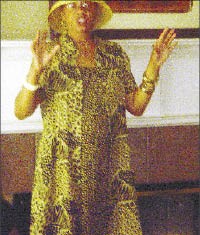 Jackson Baker
Jackson Baker
Henri Brooks is wearing more than one candidate hat this year.
One other commission race of interest is that for Position 2, in District 2, between Democrat Henri Brooks and Republican Novella Smith Arnold. This race was reviewed in last week’s Politics column, which (mea culpa) omitted the salient fact that Brooks is simultaneously running for reelection to her District 92 seat in the state House of Representatives (See Editorial, p. 16). Though clearly an underdog, Arnold is well known as a longtime social activist and former broadcaster and has some degree of support among Democrats. Her chances were further boosted over the last week by endorsements ranging from The Commercial Appeal to the Stonewall Democrats, a gay/lesbian activist group.
Other Important Races
Governor — In theory, both parties have gubernatorial primaries on the ballot, but for the Democrats that’s really just a figure of speech. And the Republican race, too, is largely pro forma.
The GOP party brass didn’t get down on their knees and plead with first-term state senator Jim Bryson of Franklin to forgo his reelection race and run for governor without making sure he would have such support as can be mustered up. (Lawyer Mark Albertini somehow didn’t grasp this. Chattanoogan Albertini, who was arrested at a Knoxville intersection last weekend for campaigning while intoxicated, has been the most active of six other Republicans who are at least nominal opponents for Bryson.)
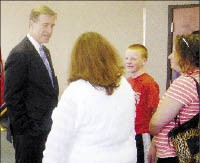 Jackson Baker
Jackson Baker
GOP gubernatorial candidate Jim Bryson greets a small band of the faithful
But one had to wonder about Bryson’s establishment support when he came to town on a fly-around a couple of weeks ago and the only press that was at the Wilson Air terminal to greet him was … moi. And the only reason I was there was because someone from the state Democratic Party in Nashville called me up with an advance retort to Bryson. Nobody acting on Bryson’s behalf ever got around to notifying the Memphis media he was going to be here.
Governor Phil Bredesen, on the other hand, is always well advanced and attended to by Democrats when he comes to town, and not just because he’s an incumbent. The last Zogby poll showed him up over Bryson, 58 percent to 22 percent. For the record, the old warhorse John Jay Hooker is one of three nominal primary opponents for the governor.
Estimated financial resources on hand show $4.5 million for Bredesen, $500,000 for Bryson, and zilch for anybody else.
U.S. Senate — Hooker has his (somewhat frayed) hat in the Democratic Senate primary, too, along with four others. But only one of those four, Memphis congressman Ford, is really in the race. For all practical purposes, Ford has the nomination in hand.
There are enough Republican candidates to make a foursome at bridge, but the unknown Tate Harrison will just have to be the dummy. Active hands are held by former Chattanooga mayor Bob Corker and former congressmen Ed Bryant and Van Hilleary. The well-heeled Corker probably has most of the trumps. (See recent Flyer story, “Senate 2006: It’s Crunch Time!” in “Political Beat” at MemphisFlyer.com.)
Shelby County Mayor — The simple facts of the matter are that Democrat A C Wharton is the closest thing to an invincible candidate in Shelby County government, and though mayoral opponent John Willingham, the Republican nominee, can make a substantial case for mismanagement and duplicity by a generation of “good ole boys,” the simple arithmetic of politics (as well as a charm quotient that is unexcelled by anybody else running locally) weighs heavily in favor of Wharton, who has been dexterous in distancing himself from Willingham’s bill of particulars.
Sheriff — Incumbent Mark Luttrell is a smooth customer and a genius at public relations. The former chief of county corrections, who seems to attend every available political venue, makes a convincing case that he has rendered both the county jail and the corrections center more efficient at less cost and has removed the jail from federal supervision. He is also quick enough on his feet to have disengaged himself from the contentious issue of privatization.
Surprisingly smooth in his own right, Democrat Reginald French makes a plausible criticism that Luttrell is concerned more with “locking them up” than with crime-prevention per se or with intervention programs. It remains a fact that Luttrell has very serious crossover support from influential Democrats and that French has some baggage he hasn’t quite disposed of — notably a tire-slashing incident several years ago. Deputy John Harvey, who has uncovered beaucoup voting abuses, is running as a write-in and could make waves.
District Attorney General — Even more so than Luttrell, incumbent Republican Bill Gibbons has across-the-board support that includes several prominent Democrats. Gail Mathes, the Democratic nominee, is making a spirited challenge, however — one based on what she sees as ineffective law enforcement behind a public-relations facade.
Juvenile Court Clerk — One of the most watched races features a rematch between Republican incumbent Steve Stamson and Democratic challenger Shep Wilbun, a former clerk who was defeated by Stamson four years ago.
Stamson is well liked and respected, and his claims of running an efficient, less costly operation ring true, but Wilbun acquired a martyr’s mantle, especially in the African-American community, after a 2002 election-year prosecution for “official misconduct” was dropped, presumably for lack of evidence. Stamson has to hope that a recent burst of Tennessee Waltz publicity about malfeasance by some of Wilbun’s former employees will curb some of the Democrat’s momentum.
Shelby County Clerk — Republican Debbie Stamson, wife of the aforementioned Steve Stamson and a longtime deputy administrator under outgoing clerk Jayne Creson, has Creson’s blessing and a presumed edge over gracious Democrat Otis Jackson, who has promised, if elected, to consider re-employing Stamson.
Circuit Court Clerk — Another Republican with an apparent leg up is incumbent clerk Jimmy Moore, who has the support of the Democratic Ford clan (county commissioner Joe Ford Sr. is his campaign chairman!) against one Roderic Ford (no relation), who is widely regarded as little more than a stand-in for maverick Democrat Del Gill‘s personal ambitions.
[image-5 ]
Criminal Court Clerk — The issue between GOP incumbent Bill Key and Democratic challenger Vernon Johnson Sr. will be resolved by turnout numbers, pure and simple.
Probate Court Clerk — Turnout will also be a key factor in this race between longtime antagonists (who have had issues both in the courts and at the ballot box). Republican incumbent Chris Thomas‘ incumbency will be weighed against Sondra Becton‘s lengthy former experience as an assistant in the office.
Register — This nondescript (if, like other clerkships, well-paying) job will most likely come down to turnout, though incumbent Republican Tom Leatherwood, who is opposed by Democrat Coleman Thompson, boasts that he has reduced overhead in an office that is, in any case, run on the basis of fees collected, not out of the county’s general fund.
Juvenile Court Judge — This race has been a dogfight between four of the five candidates. City judge Jayne Chandler has been largely a no-show (though she did pick up the endorsement of TV judge Joe Brown, a former Criminal Court judge). The favorite is outgoing Republican state senator Curtis Person, who has served for some years as a chief aide to retiring Judge Kenneth Turner. Person, whose friendships range across party lines, is backed by Turner and has the local GOP’s endorsement, as well. His chief competition may come from Democratic endorsee Veronica Coleman, the former U.S. attorney who has crossover potential herself, although another city judge, Earnestine Hunt Dorse, aided by the capable campaign efforts of her husband, longtime activist Fred Dorse, has significant support, too — especially in the black community. Not to be overlooked either is lawyer William Winchester, who, along with African-Americans Coleman and Dorse, has levied reasoned complaints about several issues that all these candidates perceive as incompletely addressed by the court, like its recent tendency to remand more and more juvenile cases to one of the county’s criminal courts.
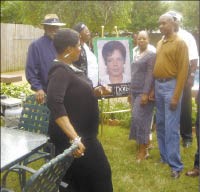 Jackson Baker
Jackson Baker
Juvenile Court judicial candidate Earnestine Hunt Dorse (left) with friends
(Note: For more complete information on these and other races on the August 3rd ballot — including those for the Charter Commission — consult “Political Beat” at
MemphisFlyer.com, where updates will appear until Election Day.)
 Jackson Baker
Jackson Baker  Jackson Baker
Jackson Baker  Jackson Baker
Jackson Baker  Jackson Baker
Jackson Baker  Jackson Baker
Jackson Baker